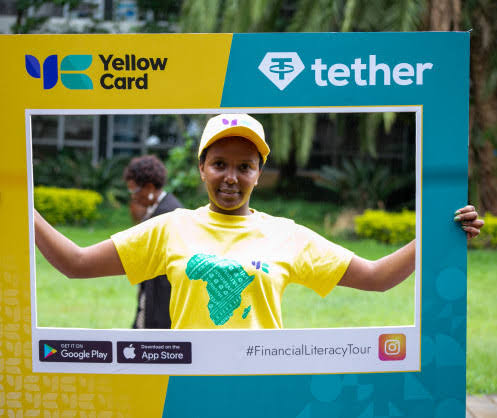Yellow Card, a major pan-African fintech and cryptocurrency exchange, and Tether, the world’s biggest stablecoin provider, have finished Phase 1 of their strategic collaboration in three key African markets.
The goal of the two-month partnership was to make students and young workers in Nigeria, Kenya, and Ghana aware of USD, Tether’s stablecoin, teach them about it, and get them to use it.
One of the activities was An advertising campaign involving Yellow Card brand ambassadors talking to people in major cities across the three countries. Another was financial literacy tours at universities.
The Financial Literacy Tour events were attended by more than 10,000 young people, including students from six universities, including the University of Nairobi in Kenya, the University of Benin in Nigeria, and Kwame Nkrumah University of Science and Technology in Ghana.
The events provided attendees with knowledge about the workings of stablecoins, a deeper understanding of blockchain technology, and the significance of making wise financial decisions.
On the Yellow Card platform, they also each received their first USD.
Director of Marketing at Yellow Card, Mr Peter Mureu, commented on this, saying, “Our partnership with Tether has given us a remarkable opportunity to witness the profound impact that financial education has on the youth.
“This partnership fits perfectly with our overall goal of promoting financial freedom for everyone, which includes our Financial Literacy Tour and the YC Academy. As the number of crypto users in Africa grows, so does the need for financial education.”
Read also:-Yellow Card receives African Crypto Licence in Bostwana
Yellow Card-Tether Partnership
The adoption of cryptocurrencies in Africa increased by 1200% between 2021 and 2022, necessitating a rapid rise in education.
But even though cryptocurrencies could be very important in the future, businesses and people are still hesitant to use them. People are reluctant to use cryptocurrencies and blockchain technology because they don’t know much about them or understand how they work. The Yellow Card and Tether project hope to help close this information gap in a big way.
Stablecoins, like USD, offer real answers to problems that are unique to Africa. African countries get a lot of money from people living and working abroad who send money back home. Tether makes it easy and cheap to send money across borders, making it less necessary to use traditional routes with high fees and long wait times.
Also, USD allows workers in the gig economy to get paid quickly and securely across countries without going through banks or payment processors.
Mr Paolo Ardoino, CTO of Tether, said, “We see Africa as a key player in the cryptocurrency and stablecoin markets.” He added, “The continent has shown amazing growth and innovation potential in the digital currency space.”
“The growing use of cryptocurrencies in Africa and the demand for stablecoins show how important it is to have easy-to-use and effective financial solutions.” Through our work with Yellow Card, Tether wants to help African communities deal with the unique problems they face.
“Our stablecoin, USD, makes it easy to send money across borders and gives people, like those who work in the gig economy, the ability to get paid quickly and safely without going through traditional middlemen.”
About the Yellow Card
Yellow Card specializes in making Bitcoin and fundamental financial services accessible while providing an exchange for digital currencies in the cash market. It is a site for exchanging currencies so that local money can be turned into bitcoins.
This makes it easier to send money from one place to another. It works with local merchants, vendors, and convenience stores that sell vouchers. Once a customer buys a voucher, they can exchange it for cryptocurrency through the company’s website. The business started in 2015, and its headquarters are in Atlanta, Georgia.
About Tether
Tether (USDT), a stablecoin that was introduced in 2014, is among the most widely used ones in terms of volume. Tether attempts to stabilise its value around a particular item, in contrast to other cryptocurrencies like Bitcoin, whose price tends to swing more erratically. Tether is a stablecoin that, as its name implies, is “tethered” to the US dollar in order to reduce price fluctuation.
As a digital token that can be utilised on several blockchains, Tether was developed. Tether, one of the innovators of the stablecoin idea, provides stablecoins backed by a variety of fiat currencies, such as the US dollar (USDT), euro (EURT), Mexican peso (MXNT), Chinese yuan (CNHT), gold (XAUT). Cross-border payments are made simpler by this digital currency technology because the value isn’t always lost in currency conversions.




